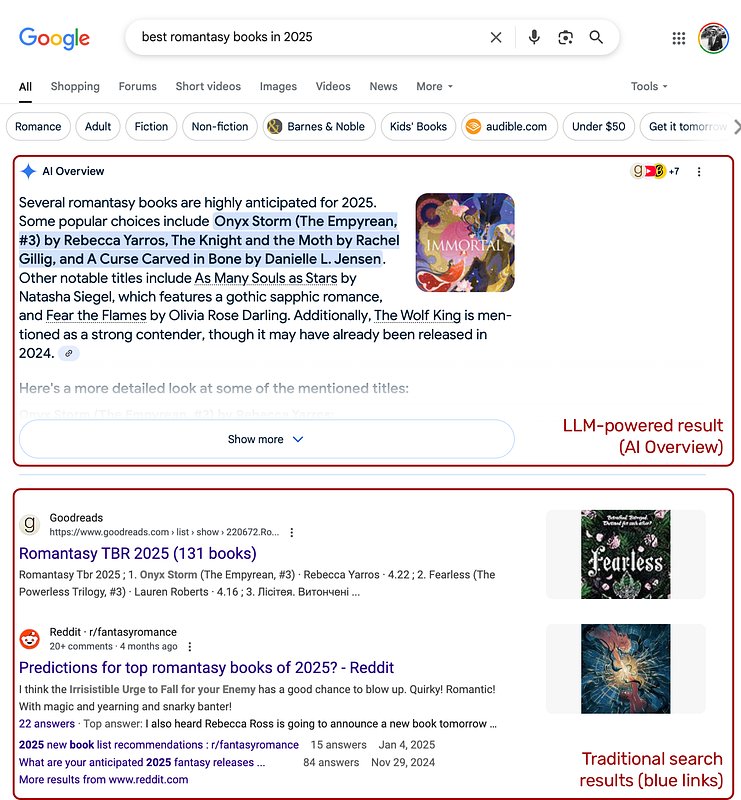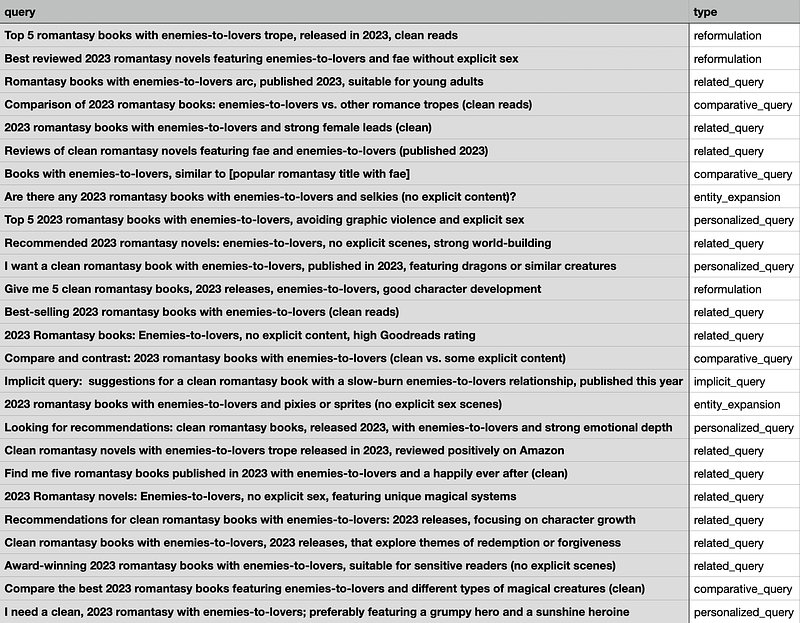Hi there,
Welcome to a new edition of the Reedsy marketing newsletter. In the last one, I mentioned that the way we search for books is about to change in a big way. I also promised that future issues of this newsletter would explore what we authors can do to prepare for the future of search.
Before we do that, though, we first need to understand how this new search paradigm works — and how it’s likely to evolve in the near future.
First of all, what do I mean by “AI-powered search?” This is effectively any kind of search where results are not pulled, ranked, and presented using a traditional algorithm (think Google or Amazon search), but instead generated by a series of large language models. It’s also called “LLM search,” or “Generative Search,” and there is already a whole industry being built around it: GEO (Generative Engine Optimization), which is seen as the future — or replacement — of SEO (Search Engine Optimization).
To give you a concrete example, when you run a Google search nowadays, you will usually see something like this:

While you still get the list of blue links that we’ve grown used to seeing on Google, those are now displayed below an “AI Overview:” a long LLM-generated answer that offers a comprehensive response to your search query (complete with sources and citations).
On top of the AI Overviews, Google is also progressively rolling out a separate search tab called “AI Mode.” This will offer an even longer and more exhaustive LLM-generated answer, powered by the latest Gemini model, which you can further converse with — think ChatGPT, but baked into Google.
Now, Google is not the only search engine using AI to provide generative answers: ChatGPT Search, Perplexity, and Microsoft Copilot all do more or less the same thing. And it’s only a matter of time before all search boxes on the web become powered by AI. For example, YouTube and Netflix are testing a version of AI Overviews within their own apps to provide users with better results when searching for the perfect video. And Amazon, the world’s largest book retailer, shouldn’t be far behind.
Now that we’ve established what AI-powered search looks like, let’s examine how it works — and what makes it different from traditional search engines.
Broadly speaking, generative search relies on three fundamental, game-changing elements:
- Query fan-out
- Vector similarity
- Personalization
Over the next three weeks, we’ll break each of these elements down in my newsletter — starting today with the query fan-out process! 🪭
How query fan-out works
While AI search engines may seem like a black box, they actually follow a clear set of steps to provide an answer. One of those steps, and perhaps the most significant, is what we call the “query fan-out.”
Simply put, the generative search engine (in this case, Google) will take your query, analyze and interpret it, and launch a series of relevant traditional Google searches. In other words, it runs not one, but dozens of different searches.
For each search that is fanned out of your original query, LLMs will take the most relevant results, parse them, analyze them, compare them to one another, and finally use all that information to put together the final answer.
You can watch a 30-second video here that illustrates the process.
To give you an example, I have used a tool called Qforia (built on Gemini) that simulates the kind of fan-out queries Google would run for a specific search. I tried a search similar to that of the last newsletter:
“Can you recommend five romantasy books, released in 2023, that feature enemies-to-lovers but have NO explicit sex scenes? They should ideally be well-reviewed and if possible, feature faes or other magical creatures.”
And here are the resulting queries that the tool simulated:

As you can see, Gemini is not only breaking down the various elements of my search (romantasy, enemies-to-lovers, no sex scenes, faes, etc.), but it’s also interpreting it and making educated guesses about what I could be looking for: “suitable for young adults,” “strong female leads,” “slow-burn,” “strong worldbuilding,” “strong emotional depth,” “unique magical systems,” “grumpy hero and sunshine heroine,” etc.
And herein lies the first paradigm change for authors looking to optimize their books for search engines: you’re not optimizing for a keyword anymore, but rather for a series of different search phrases that will be fanned out from this keyword — and which can be hard to predict.
What does Google do with all these fanned-out searches, and the results they pull up? That’s what we’ll see next week.
Until then, happy writing, and happy marketing,
Ricardo

|
|||
|
Top publishing professionals can help make your writing dreams a reality. Sign up to meet them. |

|
Copyright © 2026 Reedsy, All rights reserved.